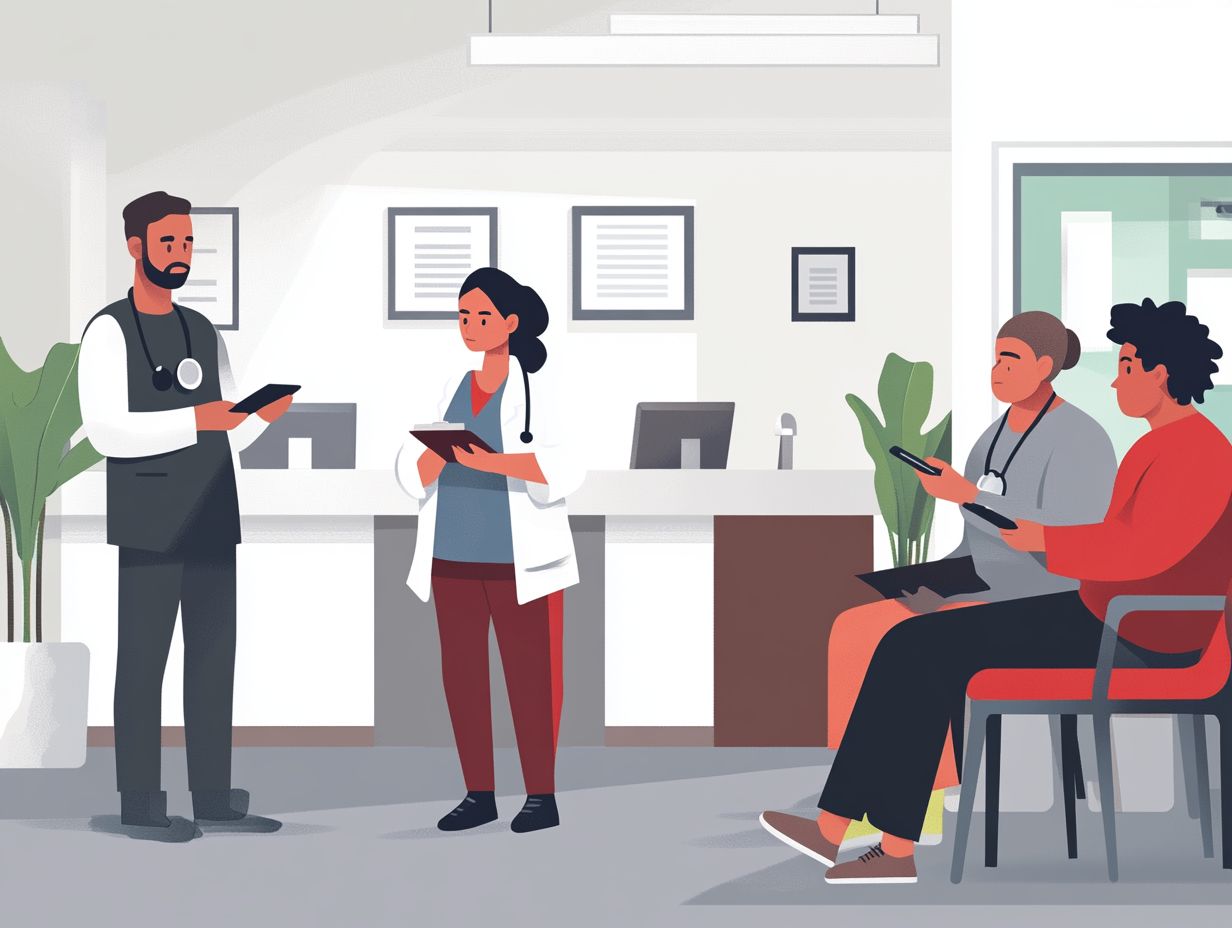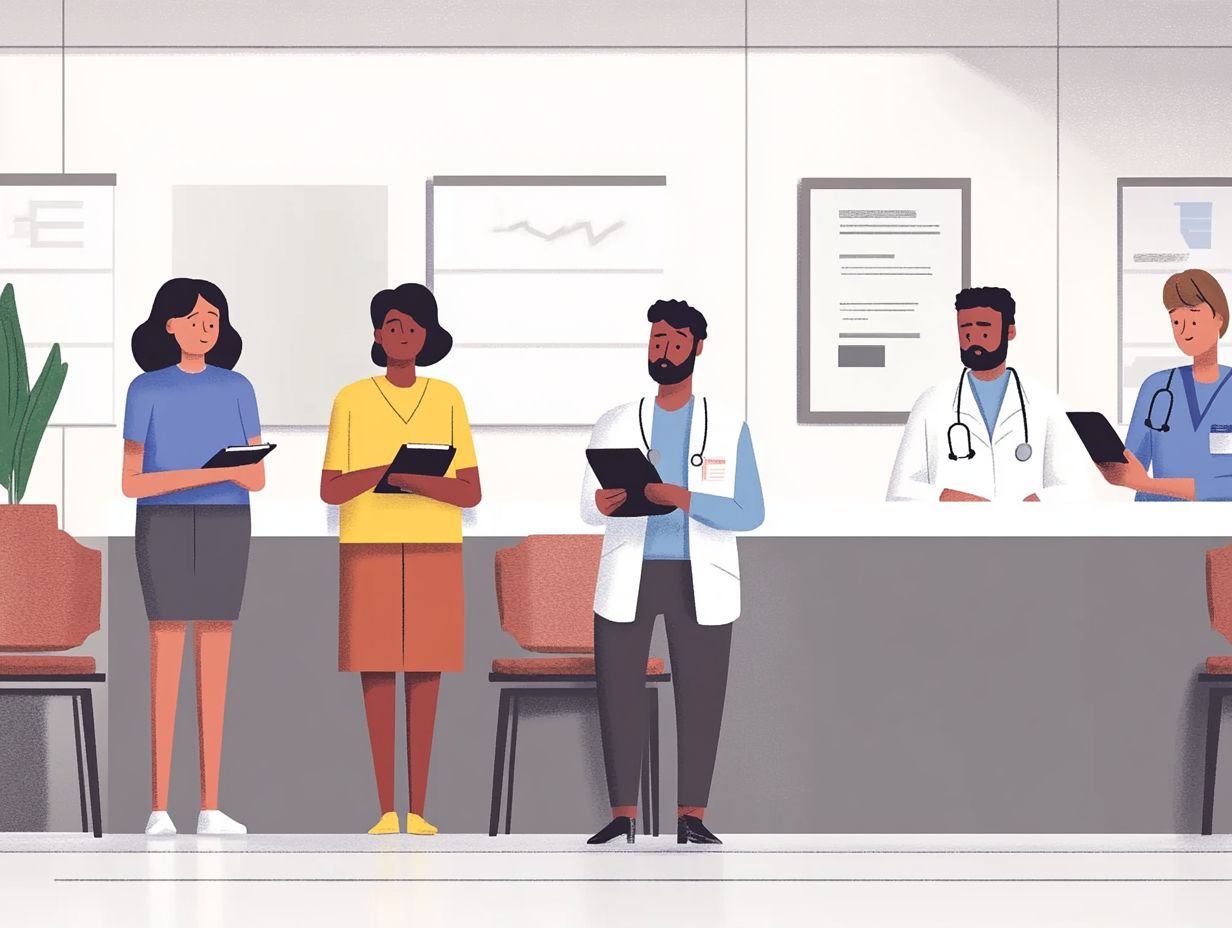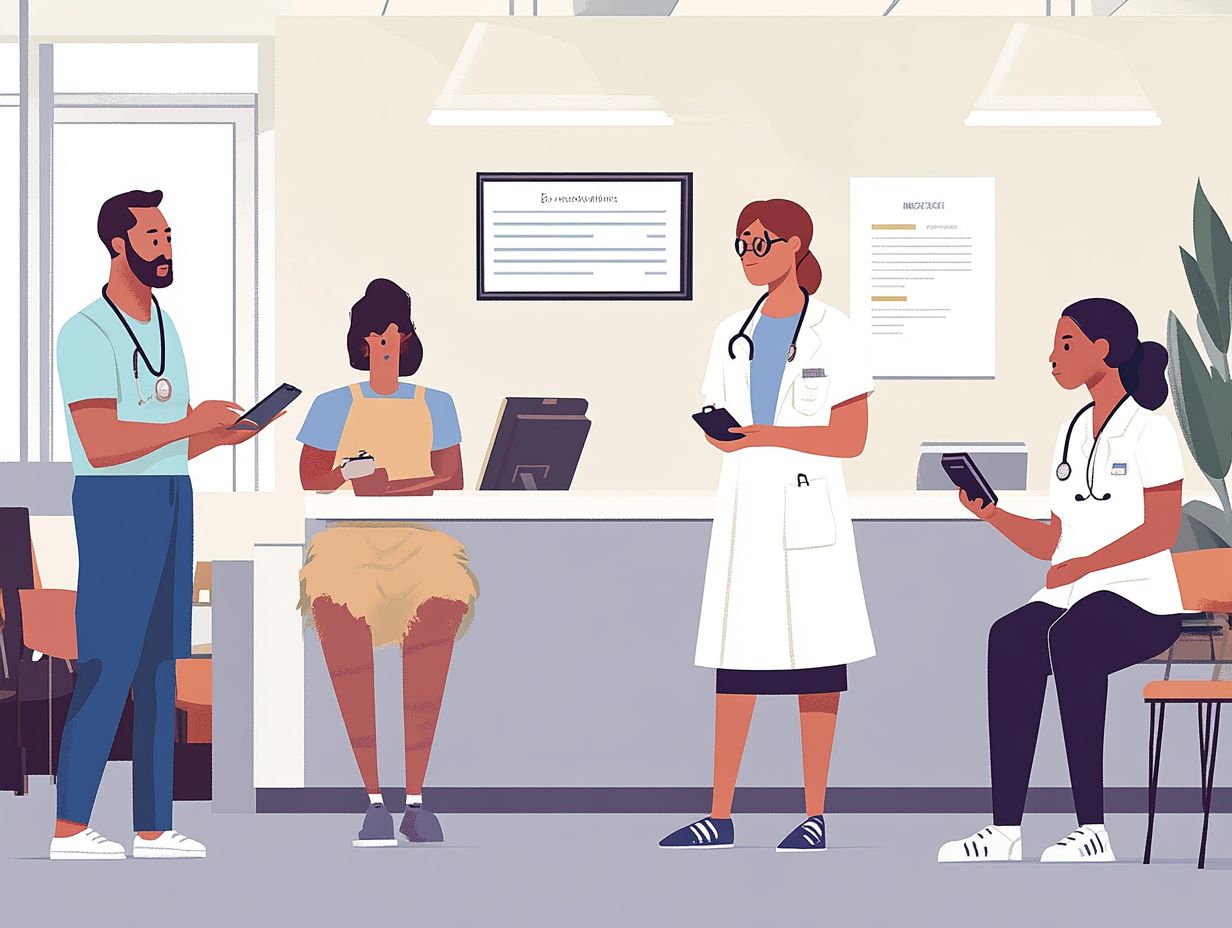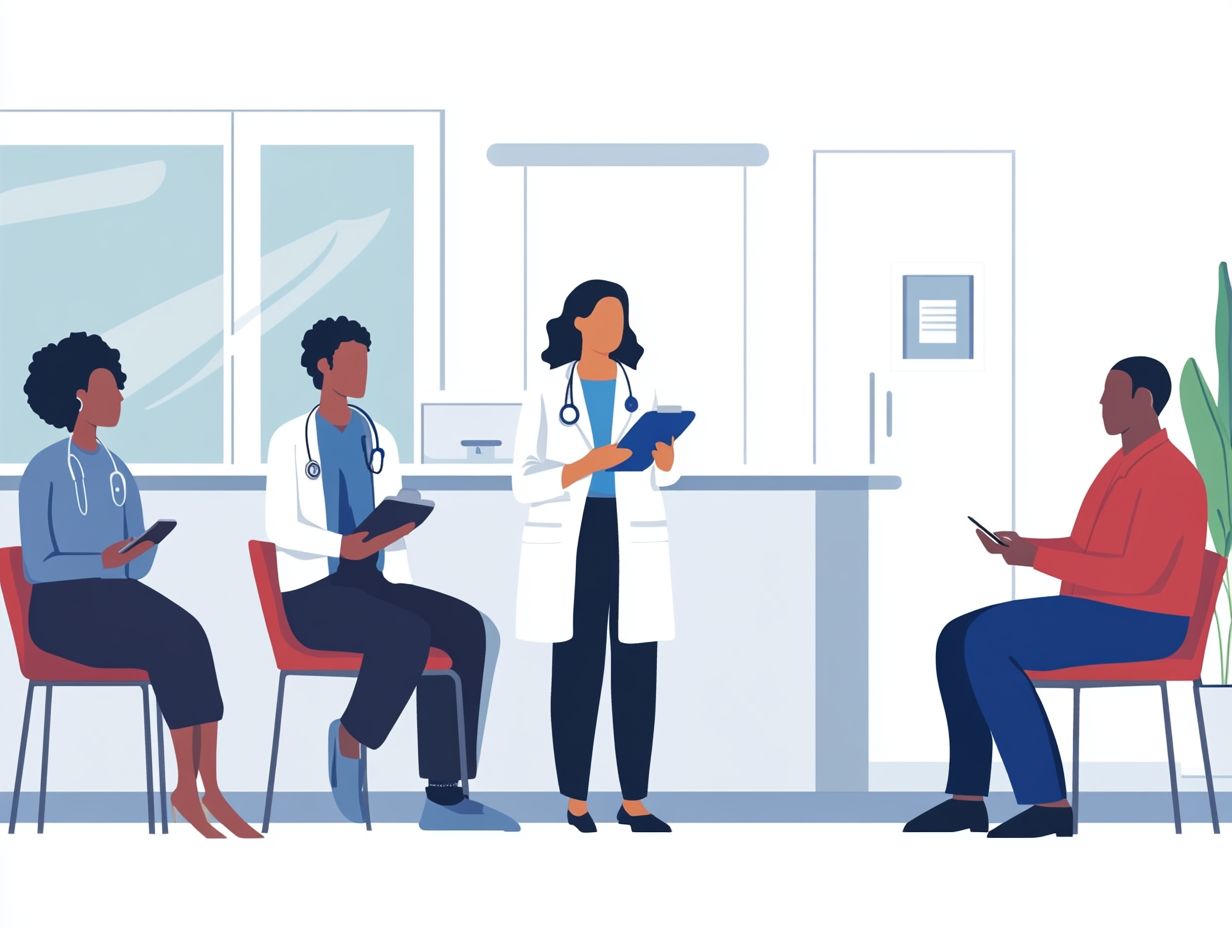Navigating healthcare appointments can be a daunting task, but with the right strategies, you can ensure a seamless and productive experience. This guide offers five essential tips to optimize your doctor visits and manage chronic conditions:
- Be Prepared Before the Appointment: Review your health history, list medications, and draft specific questions to ensure a comprehensive discussion with your healthcare provider.
- Arrive Early and Check-In: Arriving early helps alleviate anxiety, ensures a smooth check-in process, and allows healthcare teams to prepare for your visit.
- Ask Questions and Take Notes: Engaging actively by asking questions and taking notes helps clarify medical information and track treatment plans.
- Follow Up After the Appointment: Monitor symptoms and coordinate follow-ups to ensure adherence to treatment plans and personalized care.
- Keep Track of Your Appointments and Medical Records: Utilize electronic health records and patient portals for organized health management and improved communication with your providers.
By adopting these practices, you can advocate for yourself effectively, make informed decisions regarding your health, and enhance your healthcare experience. For more detailed insights on preparing for healthcare appointments, explore additional health resources or consult with healthcare professionals.
Key Takeaways:
1. Be Prepared Before the Appointment

Being prepared for a doctor appointment involves reviewing health history, listing medications with dosages, and drafting specific questions for the doctor. This preparation can address chronic illness management effectively.
Preparation ensures effective patient care by addressing health concerns, such as chronic conditions, and facilitating informed discussions.
2. Arrive Early and Check-In
Arrive early for appointments to ensure timely check-in and enhance communication with healthcare providers about health checkups and other preventive services.
Arriving early alleviates anxiety, allows gathering necessary documents, and contributes to a smoother check-in process.
Early arrivals improve care coordination by allowing healthcare teams to prepare adequately and ensure thorough discussions about health and wellness, including chronic disease management.
3. Ask Questions and Take Notes
During doctor visits, ask specific questions and take notes to better understand your health concerns, treatment options, and any medical advice provided.
This approach helps clarify medical information, remember treatment plans, and fosters effective communication with healthcare providers.
Taking notes ensures you can revisit important details and track progress, empowering you to manage your health effectively through organized information.
4. Follow Up After the Appointment
Following up after an appointment is essential for monitoring health symptoms, ensuring the treatment plan is followed, and addressing any chronic illness management needs.
To schedule follow-up appointments, coordinate with healthcare providers to determine the appropriate interval based on specific needs and medical guidelines.
Keep a detailed log of symptoms, including frequency and intensity, to assist healthcare professionals in making informed decisions.
Engaging with the treatment plan enhances communication with providers and leads to more personalized care, ensuring patient satisfaction.
5. Keep Track of Your Appointments and Medical Records

Keeping track of scheduled appointments and medical records is essential for effective health management and communication with healthcare providers.
Electronic health records (EHRs) and medical record apps help organize this information and simplify access, contributing to proactive healthcare.
Patient portals offer features like:
- Appointment scheduling
- Lab result viewing
- Direct messaging with healthcare teams
These tools enhance patient-provider collaboration and improve healthcare management.
What to Bring to Your Appointment?
For a doctor appointment, bring your health history, medication list, family history, previous medical records, and any pertinent test results or imaging reports. Utilize health documentation systems to keep everything organized.
Prepare a list of questions to ensure all concerns are addressed and to get the most out of the medical advice provided.
What Questions Should You Ask Your Doctor?
Questions to ask your doctor include:
- What are my treatment options?
- What are the side effects of my medications?
- How long will my treatment last?
- What lifestyle changes should I make?
These questions help you understand your health plan and make informed decisions.
How Can You Advocate for Yourself during an Appointment?
To advocate for yourself during an appointment, communicate your health concerns clearly, ask questions, and discuss treatment preferences, ensuring your needs as a patient advocate are met.
Prepare a list of questions before the appointment to ensure all important topics are covered.
Express personal preferences regarding treatment options to foster a collaborative environment with healthcare providers, such as your primary care physician.
These steps help ensure personalized and effective treatment outcomes, contributing to overall health engagement.
What Should You Do If You Are Not Satisfied with Your Appointment?

If you are not satisfied with your appointment, communicate your concerns to your healthcare provider directly. Your feedback is crucial for patient communication.
If the response is unsatisfactory, seek a second opinion from another professional, such as those at Genesis Medical, to ensure the best care.
Prepare for future appointments by noting down key questions or topics to discuss, using a symptom log to track your health concerns.
How Can You Stay Organized with Your Medical Information?
Staying organized with medical information involves using tools like spreadsheets, patient portals, and digital applications to track health data, appointments, and medications. Utilize communication tools for effective patient communication.
Methods such as labeled folders for paper documents or digital apps for syncing with healthcare providers help ensure quick access to important medical details and to facilitate holistic care.
What Are Some Common Mistakes to Avoid During Healthcare Appointments?
Common mistakes during healthcare appointments include not asking questions, forgetting to share health information, and not preparing a list of concerns. Avoid these to ensure effective communication.
Avoid these mistakes by:
- Asking questions to clarify uncertainties,
- Sharing all relevant health details like medication changes, and
- Preparing a list of issues to discuss.
Active participation in follow-up discussions about treatment plans is crucial for understanding and managing health outcomes effectively, especially for chronic conditions.
Frequently Asked Questions
What are 5 tips for navigating healthcare appointments?

1. Plan ahead: Make sure to schedule your appointments in advance and have all necessary documents and information ready, including your health history.
2. Ask questions: Don’t be afraid to ask your healthcare provider any questions or concerns you may have during the appointment, ensuring effective communication.
3. Keep track of your appointments: Use a planner or calendar to keep track of your upcoming appointments and any follow-up visits.
4. Bring a friend or family member: Having a support person with you can help alleviate any stress or health anxiety during the appointment.
5. Take care of yourself: Make sure to get enough rest, eat well, and stay hydrated before and after your appointment, reflecting on your health responsibilities.
Why is it important to plan ahead for healthcare appointments?
Planning ahead for healthcare appointments can save you time and reduce stress. It also allows you to gather all necessary information and documents beforehand, making the appointment more efficient.
This preparation is crucial for managing chronic illness and achieving your health goals.
Planning ahead for healthcare appointments can save you time and reduce stress. It also allows you to gather all necessary information and documents beforehand, making the appointment more efficient.
How can asking questions during appointments help with navigating healthcare?
Asking questions during appointments can help you better understand your health and any necessary treatments. It also allows you to voice any concerns or clarifications you may have.
This proactive approach to healthcare ensures you are well-informed and engaged in your healthcare journey.
Asking questions during appointments can help you better understand your health and any necessary treatments. It also allows you to voice any concerns or clarifications you may have.
Why is it important to keep track of healthcare appointments?
Keeping track of healthcare appointments ensures that you don’t miss any important appointments and can stay on top of your healthcare needs. It also allows you to schedule follow-up visits if needed.
How can having a support person with you during healthcare appointments be beneficial?
Having a support person with you during healthcare appointments can provide emotional support, help you remember important information, and advocate for you if needed.
This can be especially helpful for navigating discussions about chronic illness and treatment options.
Having a support person with you during healthcare appointments can provide emotional support, help you remember important information, and advocate for you if needed.
What are some self-care tips for before and after healthcare appointments?
Some self-care tips for before and after healthcare appointments include getting enough rest, eating well, and staying hydrated. This can help you stay physically and mentally prepared for the appointment and aid in your recovery afterwards.





